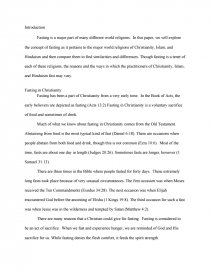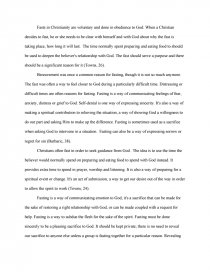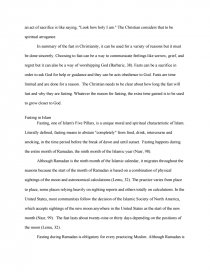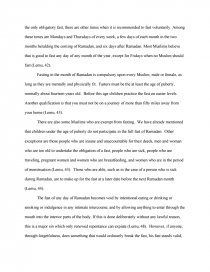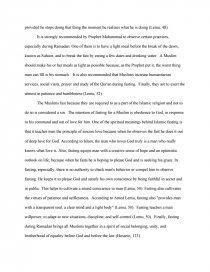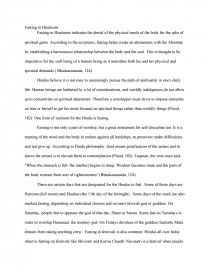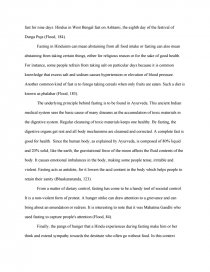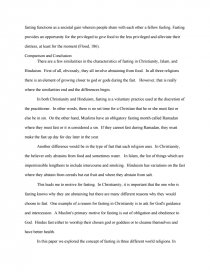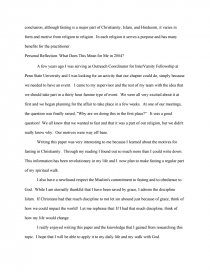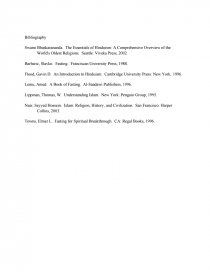Fasting
Essay by review • December 18, 2010 • Term Paper • 3,250 Words (13 Pages) • 1,810 Views
Introduction
Fasting is a major part of many different world religions. In this paper, we will explore the concept of fasting as it pertains to the major world religions of Christianity, Islam, and Hinduism and then compare them to find similarities and differences. Though fasting is a tenet of each of these religions, the reasons and the ways in which the practitioners of Christianity, Islam, and Hinduism fast may vary.
Fasting in Christianity
Fasting has been a part of Christianity from a very early time. In the Book of Acts, the early believers are depicted as fasting (Acts 13:2) Fasting in Christianity is a voluntary sacrifice of food and sometimes of drink.
Much of what we know about fasting in Christianity comes from the Old Testament. Abstaining from food is the most typical kind of fast (Daniel 6:18). There are occasions when people abstain from both food and drink, though this is not common (Ezra 10:6). Most of the time, fasts are about one day in length (Judges 20:26). Sometimes fasts are longer, however (1 Samuel 31:13).
There are three times in the Bible where people fasted for forty days. These extremely long fasts took place because of very unusual circumstances. The first occasion was when Moses received the Ten Commandments (Exodus 34:28). The next occasion was when Elijah encountered God before the anointing of Elisha (1 Kings 19:8). The third occasion for such a fast was when Jesus was in the wilderness and tempted by Satan (Matthew 4:2).
There are many reasons that a Christian could give for fasting. Fasting is considered to be an act of sacrifice. When we fast and experience hunger, we are reminded of God and His sacrifice for us. While fasting denies the flesh comfort, it feeds the spirit strength.
Fasts in Christianity are voluntary and done in obedience to God. When a Christian decides to fast, he or she needs to be clear with himself and with God about why the fast is taking place, how long it will last. The time normally spent preparing and eating food to should be used to deepen the believer's relationship with God. The fast should serve a purpose and there should be a significant reason for it (Towns, 26).
Bereavement was once a common reason for fasting, though it is not so much anymore. The fast was often a way to feel closer to God during a particularly difficult time. Distressing or difficult times are often reasons for fasting. Fasting is a way of communicating feelings of fear, anxiety, distress or grief to God. Self-denial is one way of expressing sincerity. It's also a way of making a spiritual contribution to relieving the situation, a way of showing God a willingness to do our part and asking Him to make up the difference. Fasting is sometimes used as a sacrifice when asking God to intervene in a situation. Fasting can also be a way of expressing sorrow or regret for sin (Barbaric, 38).
Christians often fast in order to seek guidance from God. The idea is to use the time the believer would normally spend on preparing and eating food to spend with God instead. It provides extra time to spend in prayer, worship and listening. It is also a way of preparing for a spiritual event or change. It's an act of submission, a way to get our desire out of the way in order to allow the spirit to work (Towns, 24).
Fasting is a way of communicating emotion to God; it's a sacrifice that can be made for the sake of restoring a right relationship with God, or can be made coupled with a request for help. Fasting is a way to subdue the flesh for the sake of the spirit. Fasting must be done sincerely to be a pleasing sacrifice to God. It should be kept private; there is no need to reveal our sacrifice to anyone else unless a group is fasting together for a particular reason. Revealing an act of sacrifice is like saying, "Look how holy I am." The Christian considers that to be spiritual arrogance.
In summary of the fast in Christianity, it can be used for a variety of reasons but it must be done sincerely. Choosing to fast can be a way to communicate feelings like sorrow, grief, and regret but it can also be a way of worshipping God (Barbaric, 38). Fasts can be a sacrifice in order to ask God for help or guidance and they can be acts obedience to God. Fasts are time limited and are done for a reason. The Christian needs to be clear about how long the fast will last and why they are fasting. Whatever the reason for fasting, the extra time gained is to be used to grow closer to God.
Fasting in Islam
Fasting, one of Islam's Five Pillars, is a unique moral and spiritual characteristic of Islam. Literally defined, fasting means to abstain "completely" from food, drink, intercourse and smoking, in the time period before the break of dawn and until sunset. Fasting happens during the entire month of Ramadan, the ninth month of the Islamic year (Nasr, 98).
Although Ramadan is the ninth month of the Islamic calendar, it migrates throughout the seasons because the start of the month of Ramadan is based on a combination of physical sightings of the moon and astronomical calculations (Lemu, 32). The practice varies from place to place, some places relying heavily on sighting reports and others totally on calculations. In the United States, most communities follow the decision of the Islamic Society of North America, which accepts sightings of the new moon anywhere in the United States as the start of the new month (Nasr, 99). The fast lasts about twenty-nine or thirty days depending on the positions of the moon (Lemu, 32).
Fasting during Ramadan is obligatory for every practicing Muslim. Although Ramadan is the only obligatory fast, there are other times when it is recommended to fast voluntarily. Among these times are Mondays and Thursdays of every week, a few days of each month in the two months heralding the coming of Ramadan, and six days after Ramadan. Most Muslims believe that is good to fast any day of any month of the year, except for Fridays when no Muslim should fast (Lemu, 42).
Fasting in the month of Ramadan is compulsory upon every Muslim, male or female, as long as they are mentally and physically fit. Fasters must be the at least the age of puberty, normally about fourteen years old. Before this age children practice the fast on easier levels. Another qualification is that you must not be on a journey of more than fifty miles away from your home (Lemu, 43).
There are also some Muslims who are exempt from fasting. We have already mentioned that children under the age of puberty do not participate in the full fast of Ramadan. Other exceptions are those people
...
...
